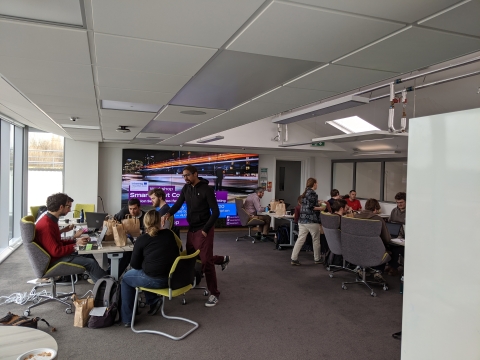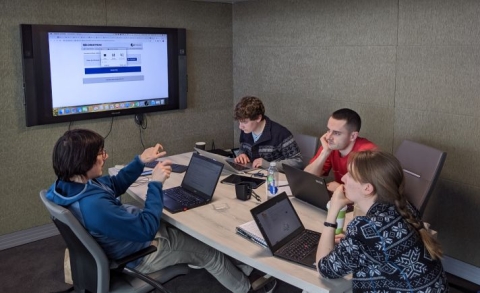

The event could lead to important research publications and real-world applications that could potentially transform patient care
The University of Portsmouth ran a Data Dive event to help find new techniques to monitor and prevent heart disease, and to understand seismic events like earthquakes.
The Data Dive event was run by the University’s Institute of Cosmology and Gravitation (ICG), from 4 to 6 March at the University’s Future Technology Centre. Participants included 19 PhD students from the Southeast Physics network, with seven from the ICG. The event was also supported by cardiologists from King's College Hospital, London.
Using cardiology and seismology data, participants worked together to apply algorithms and methods developed in cosmology research to the data intensive problems. Coronary artery disease is the commonest cause of death in developing countries. Identifying patients that are more likely to survive from heart attacks and earlier prediction of those with high-risk features will help improve patient selection for stents. Furthermore, predicting those with the highest heart recovery after stenting might improve our understanding of the recovery process after a heart attack.
It is hoped that the outcomes from the Data Dive could lead to important research publications and real-world applications that could potentially transform patient care.
Gill Prosser, ICG Collaboration Manager, said: “The event gave PhD students, engaged in data intensive physics research projects, an opportunity to use their skills to work with real-world data.

The Data Dive brought together students' research to apply algorithms and methods developed in cosmology research to data intensive problems.
This event has allowed us to identify further areas for collaboration with King's College Hospital. The outputs from the seismology strand will be part of a feasibility study for future developments for seismic sensors.
The ICG is currently running two projects, led by Research Fellow Chris Frohmaier, looking at cardiology data. He said: “It is all too easy during a PhD to become highly focussed on a specific research project and, in turn, lose the perspective on the broader application of your skillset. Data Dives are an excellent opportunity for students to work on new and exciting projects, solve key questions in an interdisciplinary environment, and learn that they are more than their PhD. It was exciting to seeall the wonderful insights physics researchers provided on cardiovascular data.”
Participants also looked at data of seismic waves traveling through the ground, and sound waves from rock fracturing under very high stress. They used data from sensors to develop new approaches to understand and predict the motion of the ground and to analyse the very high data volumes from laboratory experiments in geology.
Andrew Lundgren, Reader in Gravitational Wave Physics in ICG, added: “Even the tiniest motion of the ground is a nuisance for our astrophysical measurements. In this Data Dive, we wanted to turn the tables and apply our methods to better understand how rocks fracture and how seismic ground motion is generated.”
